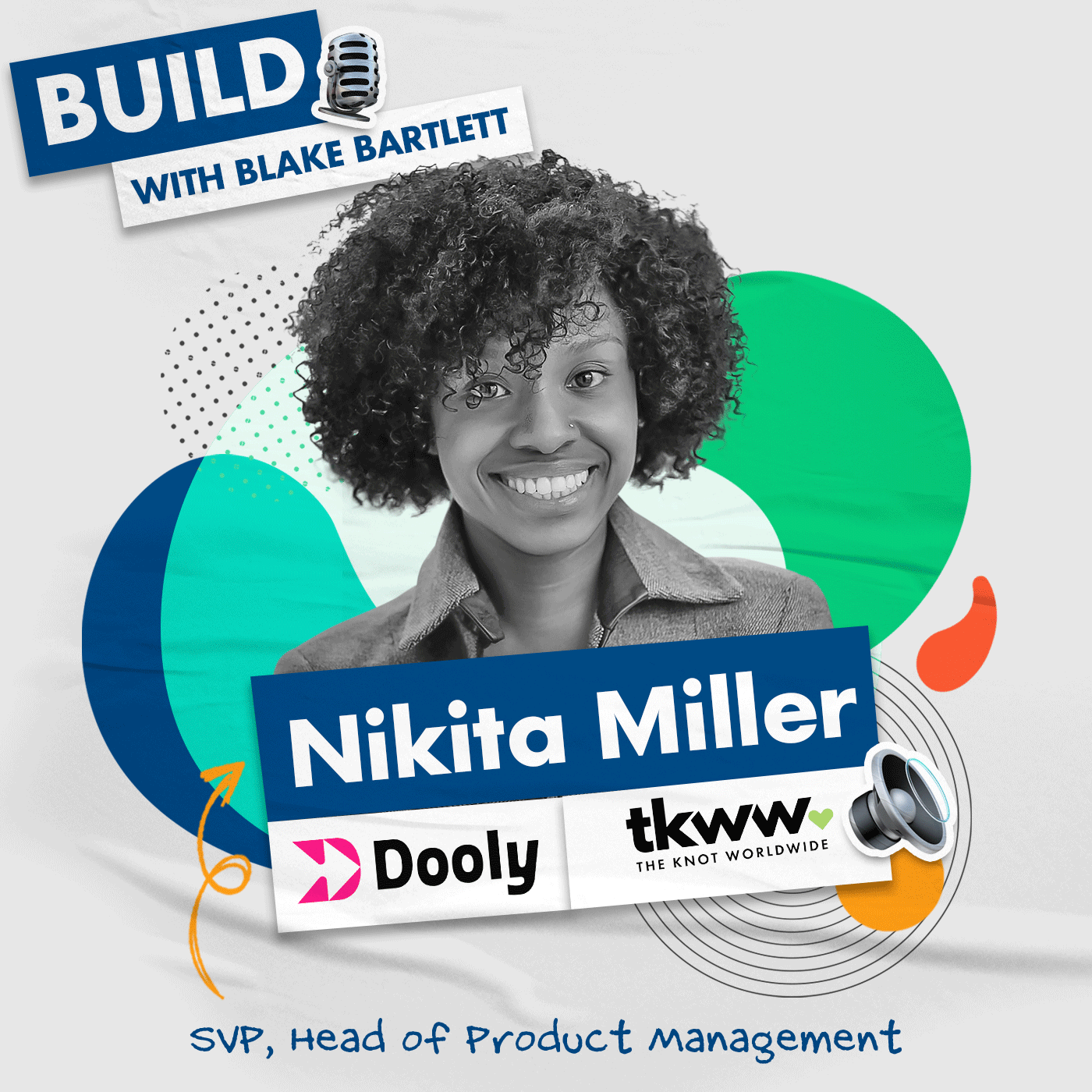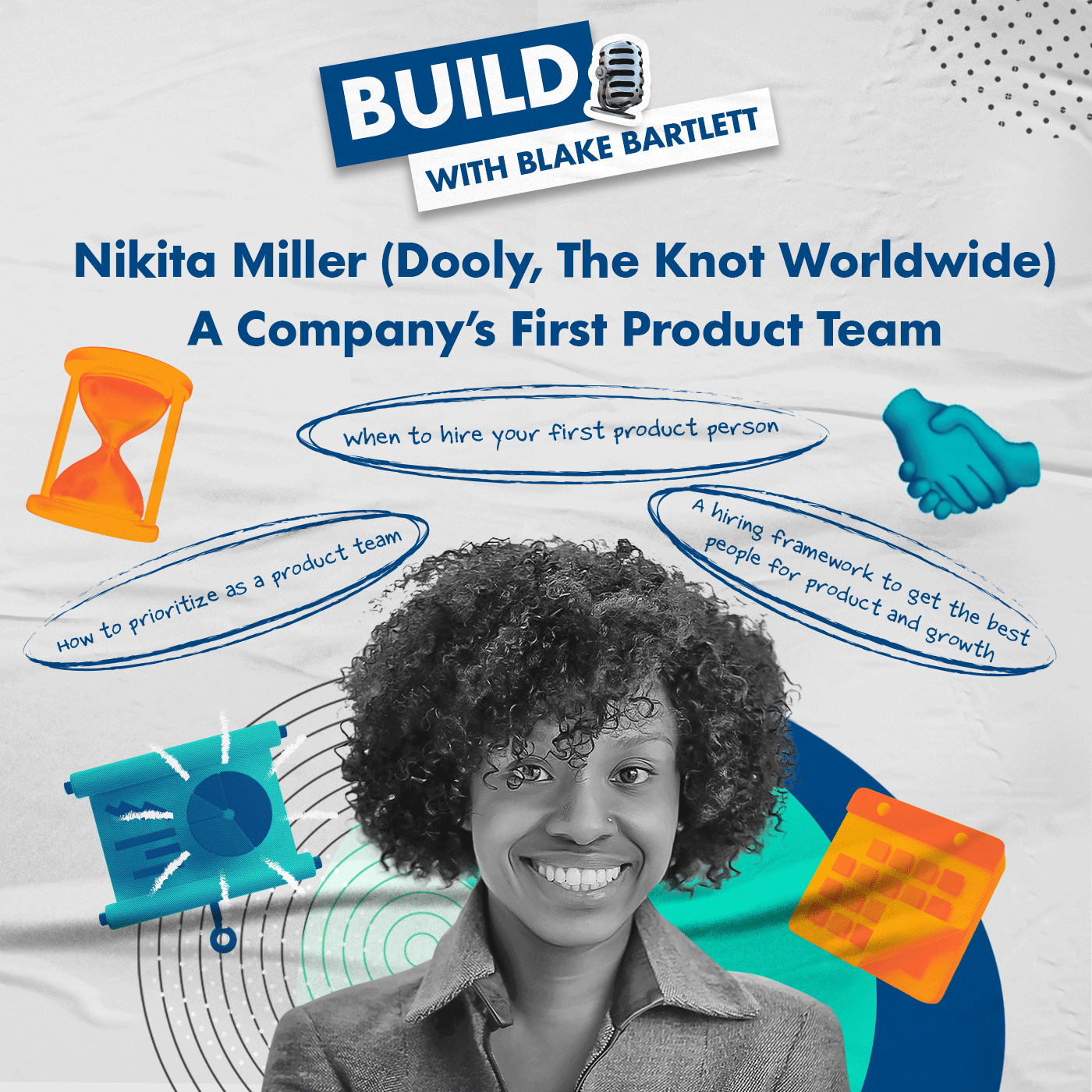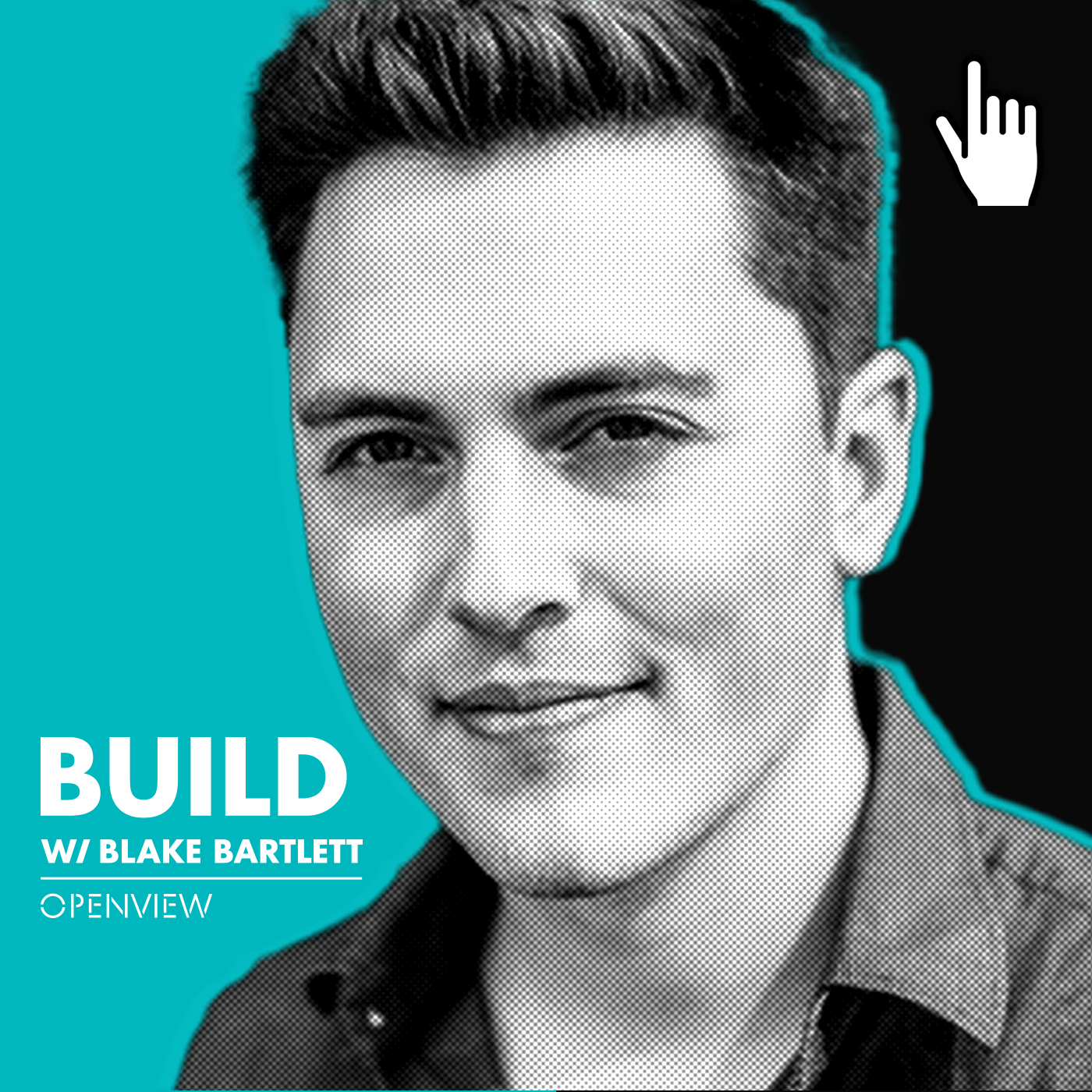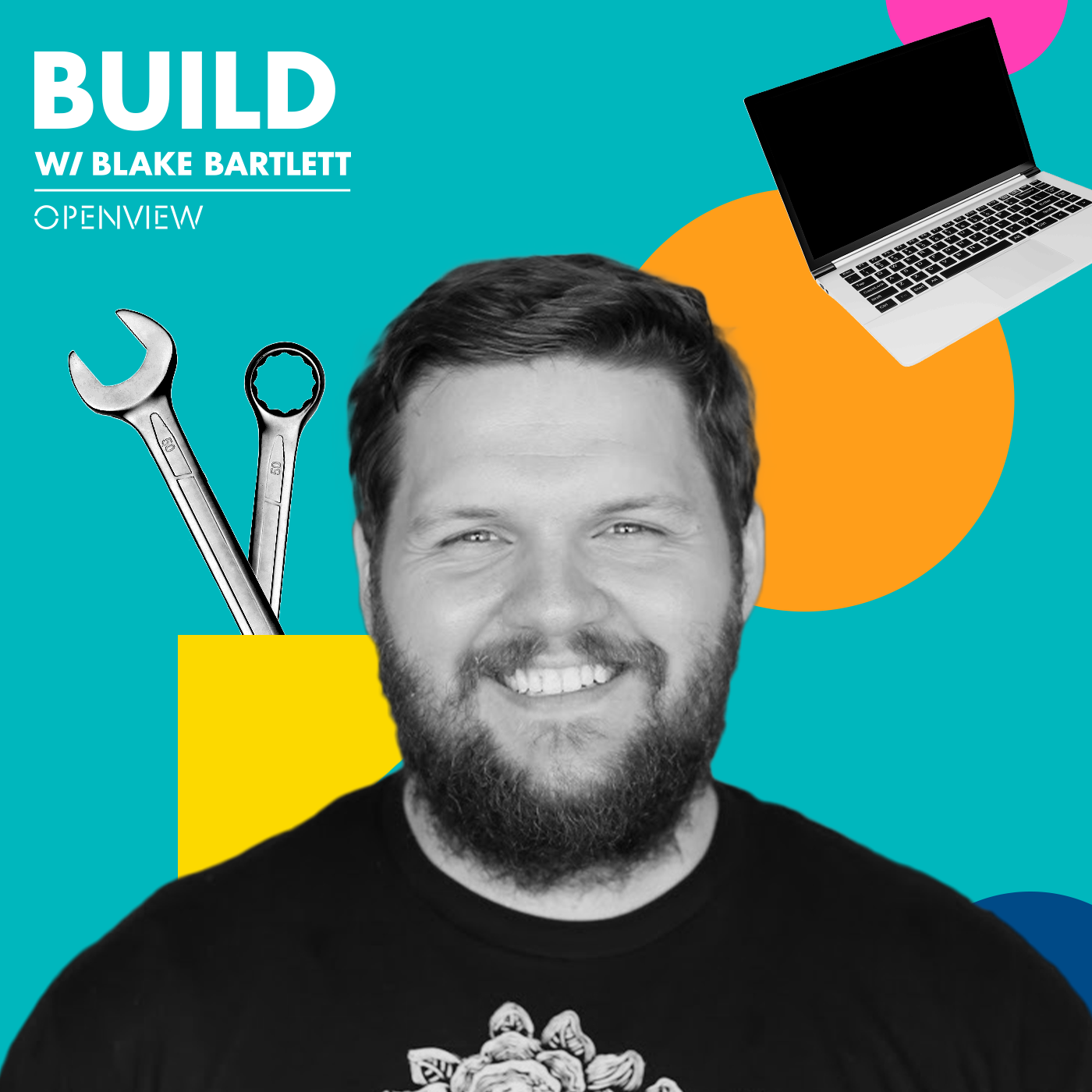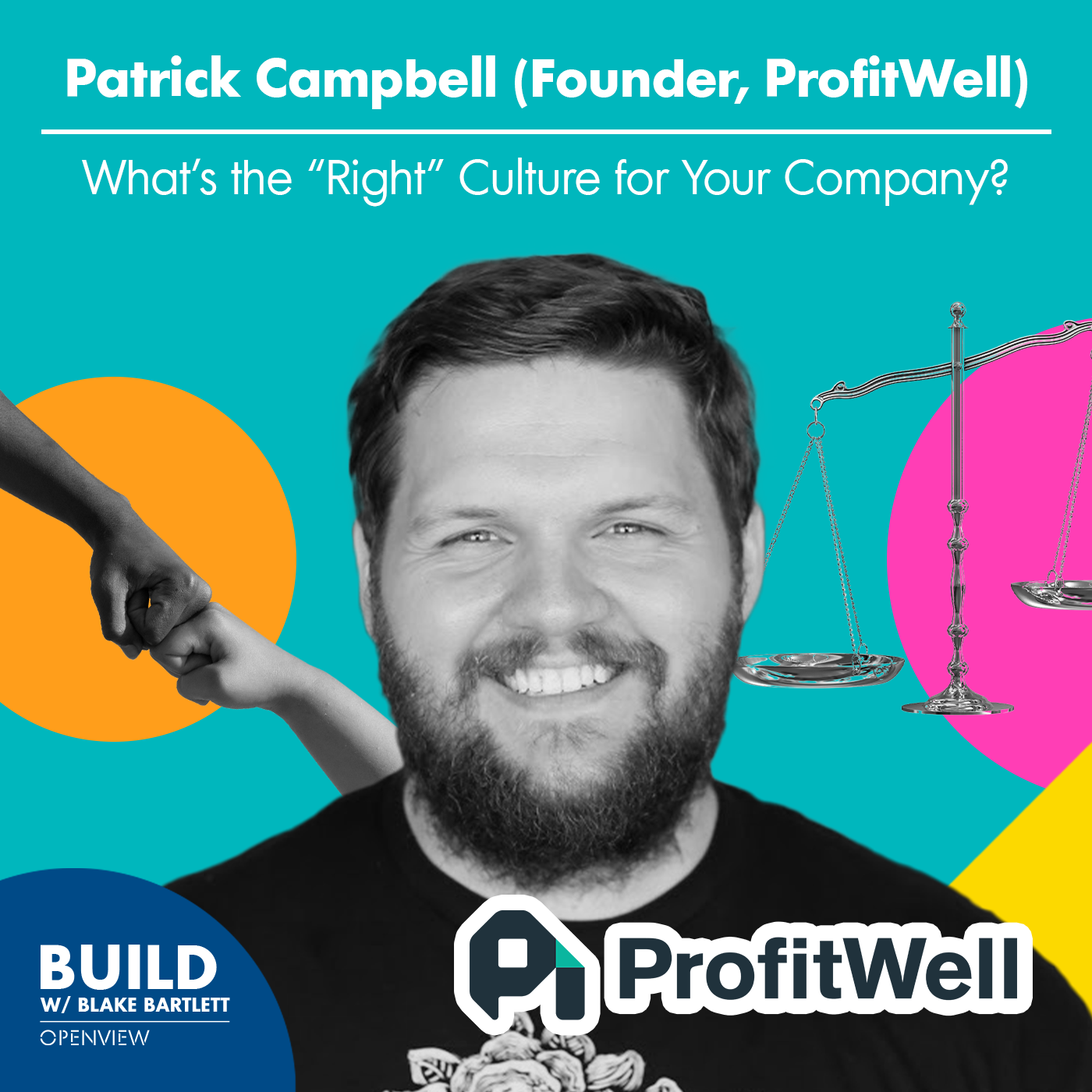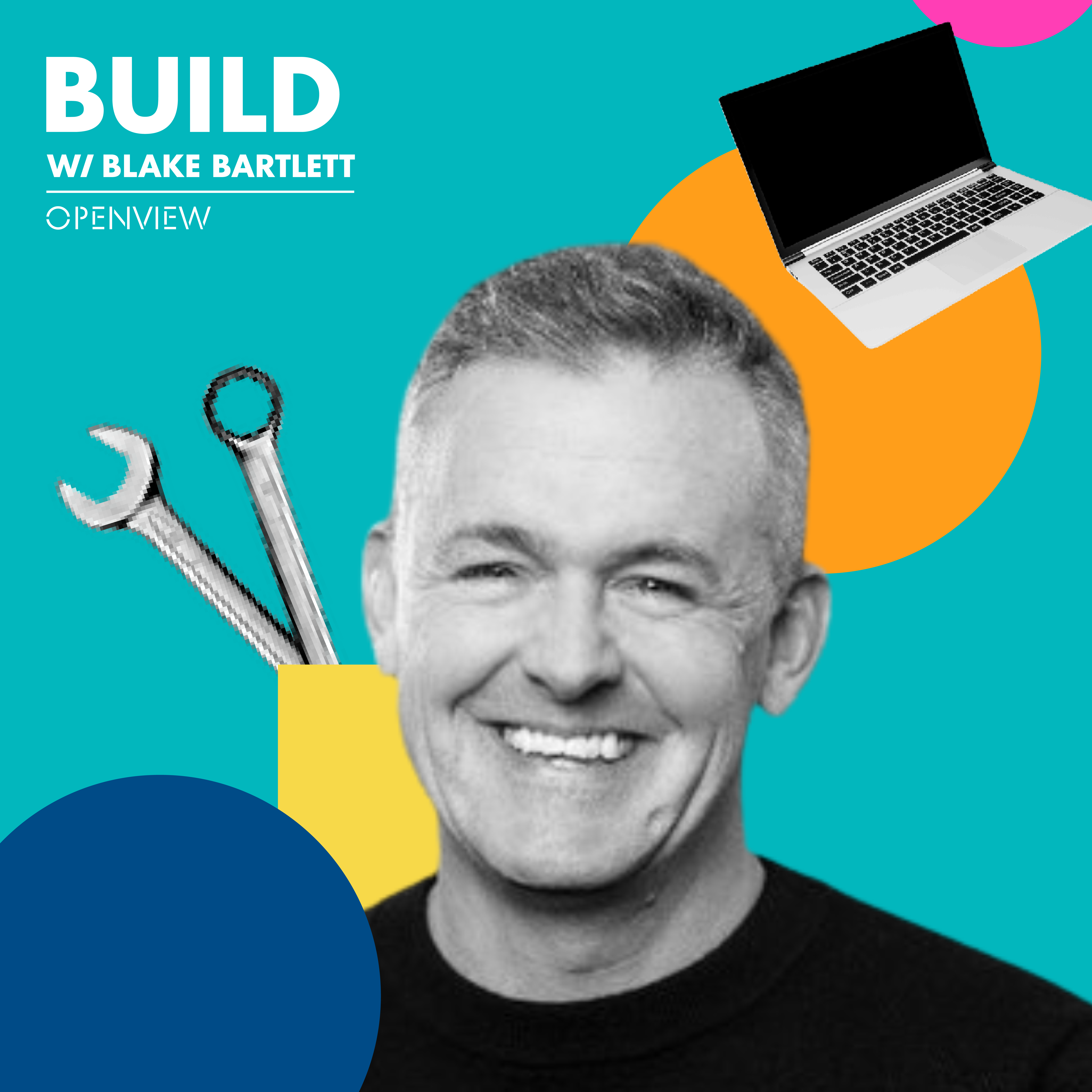Nikita Miller (The Knot, Dooly): A Company’s First Product Team
- 0.5
- 1
- 1.25
- 1.5
- 1.75
- 2
Nikita Miller: I'm personally of the opinion or the perspective that the sooner you hire a product person, the better. As you said, in the founder relationship, there is someone who tends to be the product person or product visionary to begin with. And while that's really important, I think there are a lot of practices that it's really important to get into an org fairly early on for longer term success. And the founders don't necessarily have that experience.
Blake Bartlett: Welcome back to the BUILD podcast. I'm Blake Bartlett, a partner at OpenView. The world of SaaS is always evolving and we are here to help you adapt, compete, and win with your startup. The BUILD podcast brings you stories and insights from my conversations with the most successful people in SaaS. In today's episode, I chat with Nikita Miller. When we spoke, Nikita was VP of product at Dooly, where she was building out the company's product team following a large fundraise. Prior to Dooley, she built up the product team at Trello during its hypergrowth days. In today's conversation, we talk about Nikita's experience building these product teams and what advice she has for startups who are building out their company's very first product team. All that and more on this episode of BUILD. So let's dive in with the Nikita Miller. Well, Nikita, thank you so much for joining us here on the BUILD podcast. It's great to have you on the show.
Nikita Miller: Thanks, Blake. I'm really excited to be here.
Blake Bartlett: So we're talking today about building your starting product team. For young companies, where do you start when you're building out the product side of your organization? And I think for a lot of folks listening right now, we have a lot of founders and a lot of founders of early stage companies. And in the early days, the founder or the founders often play the role of product leadership. Or oftentimes, one person product band, doing everything in relation to product. But you reach a point at which you obviously need to then hire a first product person. So what does that look like? When is that time? What does that person look like? What have you seen?
Nikita Miller: I'm personally of the opinion or the perspective that the sooner you hire a product person, the better. As you said, in the founder relationship, there is someone who tends to be the product person or product visionary to begin with. And while that's really important, I think there are a lot of practices that it's really important to get into an org fairly early on for longer term success. And the founders don't necessarily have that experience. For instance, building out a research practice. For most teams, that's probably something you should do fairly early on. Understanding development cadence, doing competitor analysis, having someone that's keeping kind of a pulse on those things are things that probably all teams can benefit from. And founders don't usually either one have that expertise or honestly the time to do that. And so that's one of the reasons I think bringing someone on early as a PM, who is likely an IC at that point to help put some of those practices in place while helping out with execution is really important. There's usually a little bit of tension maybe about what the role of this first product person, are they a product leader, are they not? And I think that first person needs to be someone that's really great at execution because when you're super early, it's usually the founder. That's what I like to call the keeper of the vision. And you probably want to keep that intact for quite a while. But also compliment that with a little bit more of what's now being called, like the professionalization of product managers, just to add a little bit more rigor and process to what's already happening.
Blake Bartlett: That definitely makes sense to me. And I see that a lot with early stage companies. I think within product, my high level view of it is that there's kind of two core aspects of product. One is the product vision, which you had described. Which obviously, starts with the founder and oftentimes ends up continuing to be led by the founder," We're building the future and I have a vision for what this looks like." So there's that visionary," Where are we heading long term? How do we get there? How do we invent the thing that the market wants?" That visionary aspect, but then you actually have to do it. And you have to get the trains to run on time and you have to actually productize the vision and build the product. And so it becomes the more true product management and project management side of delivering on the vision that you have. And I think a lot of times, it can be easy to view those as," Well I'm the product visionary. So therefore, I will continue to lead product." But you can overlook these necessary aspects of logistics and getting the thing out the door.
Nikita Miller: And I think it's also one of the things when you're hiring the first product manager or the product person, actually the sooner you clarify those roles and responsibilities, the better. So that if it is the fact that the founder is the keeper of the vision and they're going to be super connected to it, and they're the ones that are kind of doing that work to make sure that the vision is at least understood and internalized, I think that's great and a good thing to make very clear with whoever the first product person is early on. But then the execution, how do we actually break this up into tangible goals? How do we actually set goals, for instance? Goal setting is one of the things that I think many founders, unfortunately, aren't that with, but are things that I think a lot of practice product managers do. And so having someone to help a founding team figure out," How do we set goals and milestones early on? And also how do we then understand what success looks like for these milestones?" Are the kind of conversations that I think having a product manager earlier in the process helps with. I found that once a team gets into... They get going, they're a little bit closer to the growth phase of the company, then all of a sudden, you have to bring in consultants and other folks to help you figure out what goal setting really is and why it's important, what does success look like. And that's a sort of practice that I think earlier is better, and product managers can often help with that.
Blake Bartlett: When you go from zero to one, then you start building a team around that first product hire. So let's talk about team structure. What are the starting roles to think about when building the team after that first hire?
Nikita Miller: For the starting roles, I tend to think of it usually teams are really constrained. You only have headcount for a few people. You may or may not have raised funding. And so that first roster of a product org is super important. I tend to think that you need at least a couple of folks on that team that are experienced, not necessarily early in startup phase in the startup process, but with product management or overall just kind of operations and business, I think early on, that's really important. I tend to think that you really need to start evaluating for folks that can have managed and adapted to change really well, because that's probably one of the biggest things that the first hires need to be able to do. Which is know that it's a changing landscape, know that the strategy might change, know the company might pivot and figure out how to manage that while also being productive. And that's actually fairly hard, which is why the first couple of hires might need to be more seniors. I'd say probably still ICs, but fairly senior. I've just been actually going through a lot of this process at Dooly and the way that I've approached it so far, the way we've approached it, is trying to understand looking at the current team, where are the gaps and weaknesses in the organization. Whether that's in myself as the product lead, whether that's in the founders and whoever have been there for the past couple of years. So I tend to do a little bit of a skills map, which is looking around to understand what are the core competencies of the folks that are here, where the areas that I think that we're lacking for whatever reason, and what might that role or that profile look like? Assuming you start developing your data analysis as an organization, that's also super important. And so looking for someone that has, whether it's in developing products before or even an analyst background that's really excited to jump into product, that's really interesting to me because these folks can also then help the rest of the organization level up in what I consider core competencies for product orgs. So there's always this dynamic, this question about," Who's in growth, who's in not? Like is a growth phase? And do you need a growth team? And what might that look like?" So one of the ways that I've been thinking about that, is how do we find someone that has a growth background doesn't necessarily need to be a growth lead, but has some experience in it that could be in product management. We've just hired this really awesome woman who has a growth marketing background, who is now a product manager and can kind of bring all of those things to where we are right now. And that's in part because at this early stage, we're probably going to need all of those specializations at some point, but we don't for whatever reason need them right now. The other reason I think that's really helpful, is it helps cast a little bit of a broader net for who might join the organization. You don't necessarily need the perfect PM background in whether it's productivity software, or collaboration software necessarily. So you do need someone that can manage change, is wicked smart, and has some experience or expertise in some of these core areas. One of the other things I've been thinking about recently, and I experienced this at Trello as well, is understanding the value of product marketing. And so in building out the team, it's you have the PMs who everyone has some experience with go- to- market, obviously. But I think in the past few years, especially with my experience at Trello and now here at Dooley, I've come to really, really value the role of the product marketer as the person that can help bridge a lot of what's happening, not only within the product team, but obviously with the marketing team and also with sales and CS. And so I found recently that that particular role been really instrumental in helping to move a lot of our team and our work forward that. I would encourage folks that are listening, that if you find the right person could be a really great leveling up for the whole org.
Blake Bartlett: Yeah. Because you can build the best product ever. But if you don't know the right way to describe to the market what problem it solves and why they should buy it or start using it now, then it's never going to get adopted or the adoption will be suboptimal. So it's kind of two sides of the same coin. You need the right product management to build the product, but then communicate it the right way, so it gets adopted.
Nikita Miller: Right. And then you need the right product narrative. The other thing that's really fun about that from building out the team perspective is a lot of startups, we don't have growth plans in place, for instance. Like that's also something that you want to have right now. But honestly, it takes a bit more time as the organization grows, as we understand where the opportunities are. And I think starting to develop with the skills gap, it also gives people an opportunity to come in and kind of own" spaces". So you have a team come in and you can provide the opportunity to say," Okay. Well, we're deficient in this area. You're great at it. Like help us figure out how to level everyone up in this area." And so you now have autonomy and responsibility in a way that I think is really helpful for growth. Even if specific growth profiles haven't been created yet. I think it's a great way to help the team start. The other is I think it's really good as you start to do the actual... The team has formed and now you're figuring out," How do we work together? How do we make sure this makes sense? How do we make sure that we're actually delivering high quality product over time? How do we make sure we're collaborating well?" One of the exercises I really enjoy doing, is the superpowers that exercise, where everyone gets to talk about what are their superpowers, what's their cryptonite? And as a team, you can then start to figure out," Okay, cool. How do we piece all these things together? Like you're great in this area. I'm great in this. I'm not so great here. How do we make sure that we're calling on each other so that we can make this team and this product better?" And I think having that view, in some ways on kind of how to create diversity in your team, is really helpful for doing that.
Blake Bartlett: So what do you look for when actually recruiting and what are your sort of product recruiting hacks? How do you find that right person? How do you get them in the seat? What's been your experience?
Nikita Miller: I take a lot of time going through resumes and I tend to ignore, I think a lot of the normal things around like," Where'd you go to school? What's the name of the company?" And I actually focus a lot on how folks describe their experience and also, what they're great at. That's something that I spend a lot of time on. So I think I've often potentially brought in candidates that others might not have for that reason, because I think," Oh. Well, this person worked at this really small company, but they had to deal with a lot of changed management in this particular area. And that's the kind of thing that we need right now. Because we know that a lot of things are influx, so what might that look like? Or this person has a highly technical background, but we're a B2C company. But that person also has great experience in platforms that tend to do the hiring manager screen. And a lot of that is really about listening and hearing more about how people describe their experiences. We ask these questions," Describe a time when." And you can sometimes anticipate what folks are going to say, and then you probe a little bit deeper. And I said," Okay, well in that situation when things didn't go well, then how did you respond? Okay. And how did you know that it was success or not? Okay. And then how did you...?" So there's just a lot of follow up questions in trying to get an understanding how folks problem solve and how they deal with uncertainty. And I think that's one of the things, especially in startups, that you really want to get a handle on fairly quickly.
Blake Bartlett: So once you get the people in seat and you have a team, now you can start doing the work, so to speak now that the team is in place. So what does the work look like? What is the starting product team doing? What are you focused on? How do you think about prioritizing when there are so many things that you could tackle?
Nikita Miller: Yeah. A few things. I mentioned before this idea of the founder as the keeper of the vision, I really believe that especially for an early team. And I think a lot of starting as a PM on that team is spending a lot of time with the founders to start understanding and internalizing that vision just to get a sense for what's actually going on there, how do the founders see what the world looks like in 5, 10, 15 years, whatever that ambition is? I think that's an important first step. I think a lot of the first product team was around validation and that goes into execution as well. Like, how do we execute on all these things, but also very quickly validate and understand whether or not this is the right direction? I think you really can't underappreciate, rather how important it is to just do the hours and hours and hours of user interviews. Like take the time to understand who the customers are. So the team does a lot of that and I think that's something for all teams to do. And another that I probably should start with, is this question of how do we figure out what to build, and when, and how is something that I think is a lot of the product discipline and process, and how do we start doing that? And I think a lot of that comes out of what we need to do at the beginning in terms of understanding the founders vision and mission, understanding our users and our customers, whether they're using a product or not. Potential customers digging into the data and understanding signals, understand the competitive landscape. From my perspective, all of those things that early are the things that'll help us start getting a better handle on what the strategy is. I'm of the firm belief that all of those things in terms of the data, the signal, the landscape, the research, the prototyping, the validating, all of those things are what will actually inform the strategy of the product org.
Blake Bartlett: Which comes back to one of the things you mentioned about recruiting is looking for folks that are comfortable with uncertainty and know how to deal with uncertainty. Because in startups, that is the name of the game, including at the strategic level, you're building the strategy, you're figuring out real time. And there's a lot of dynamism in that and a lot of uncertainty. So Nikita, in closing now we've built the starting product team, we've got the folks in place, we're doing the work, we're building the strategy in real time, we're adapting to change and uncertainty. So taking a step back, what does success look like for a starting product team say one year in?
Nikita Miller: I think one, success looks like a team that is tightly knit, excited to work on this idea, this problem, and even more so excited to work on it together. I think that is what success for that team looks like. Because as you mentioned, it's an iceberg and there's a lot of really hard work that isn't glamorous that goes into kind of building incredible products. So I think one is like a team that's really excited about the work and how we're approaching and solving these problems together. And I think the other, it depends on I think, the stage of the company, the other is having executed on a few, maybe a couple of really big bets and learned from them. Whether they've been successful or not, but actually a couple of big bets that have gone to market and have informed either whether we're going in the right direction. And so let's going there and figure it out or not. And have forced us to change course. I think that having to get to that point actually takes so much work in terms of building the team, validating, doing the research, data analysis, et cetera to get to that. And also as an org, the idea that a team can be committed to a couple of big bets is actually culturally and organizationally a really hard thing to do. But I think that's usually a good sign that at least the team is high functioning and the product is open and prime for development.
Blake Bartlett: So what I heard in that description of how you measure success, it's almost back to this framework of drawing a line and a distinction between the what and the why and the how. So with product teams, you need to have a what, so like you said, having a couple of big bets that have gone to market and those having been successful, you need to have that. But equally as important is the why and the how, and that really comes down to the team. And having that dynamic that you described, where after one year in, you have a cohesive team, you have that alignment, and you're excited to keep building together and keep having big bets that go to market in a successful way. That's just as important as the things that you shipped.
Nikita Miller: Yes, you're good at this.
Blake Bartlett: Awesome. I think that's a great place to leave it Nikita. Thank you so much for sharing your wisdom with us on how to think about architecting a team, then building the team, hiring the team, and getting them to be productive and successful together from these starting phases of product. This has been an incredibly helpful conversation for me, and I know it will be for our audience as well.
Nikita Miller: Awesome. It's wonderful to be here, Blake. Thanks for having me.
Blake Bartlett: Thanks for listening to this episode of BUILD. If you like what you've heard, leave us a review on Apple Podcasts and subscribe to stay up to date with all the new episodes. Want more insights from OpenView? Follow me, Blake Bartlett on LinkedIn for daily PLG content and head to our website to sign up for our weekly newsletter.
DESCRIPTION
Key Takeaways:
[2:11] Where do you start when you’re building out the product side of your organization?
[4:50] Nikita talks about the importance of clarifying the roles and responsibilities of the Product Manager
as soon as she or he is hired.
[6:12] What are the starting roles to think about when building the team after that first hire?
[10:46] Nikita shares on the need to have a growth plan during startups.
[12:09] What does Nikita look for when actually recruiting?
[14:05] Once you get the people in seats and you have a team, what does the work look like?
[16:34] What does success look like for starting product teams?
Mentioned in this episode:
Nikita Miller, SVP, Head of Product Management
Follow Blake Bartlett on Linkedin.
Podcast produced by OpenView.
View our blog for more context/inspiration.
Today's Host
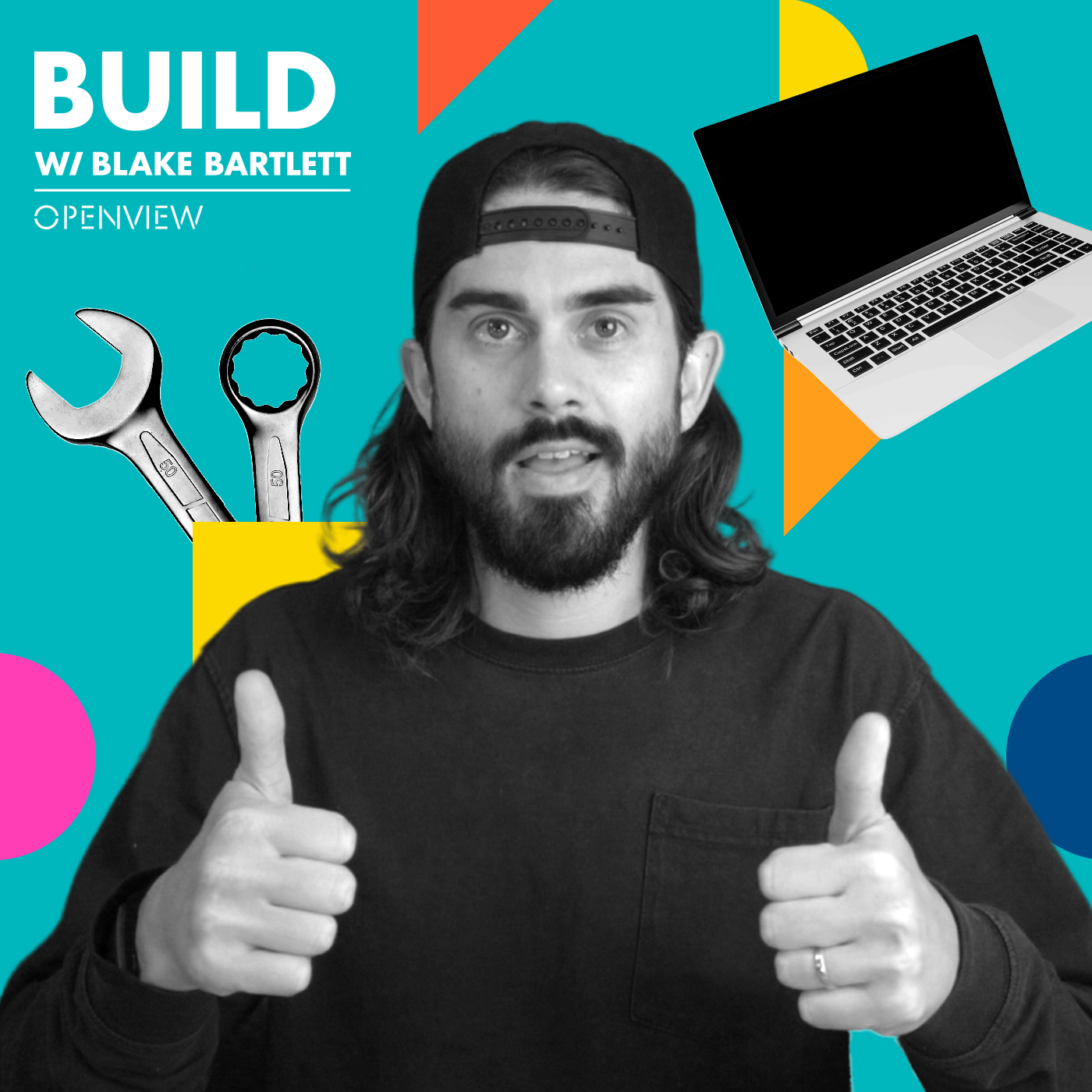
Blake Bartlett
Today's Guests
